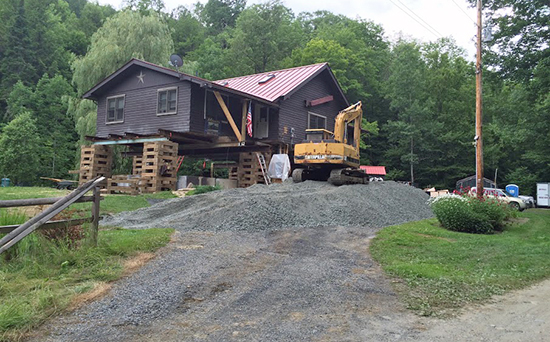In the wake of Tropical Storm Irene, towns across Vermont – including Waitsfield and Moretown – applied for and received grants from the Federal Emergency Management Agency (FEMA) to rebuild municipal buildings after flooding. In the past two years, however, FEMA has made funding available to those looking to rebuild before flooding, and it's available not only for public structures but for private homes.
Moretown residents Clayton and Sandra Wetzel applied for and received a FEMA Hazard Mitigation Grant for $113,000 to raise their 1,800-square-foot log cabin 10 feet so that it would sit above the threat of rising water.
"We live in a special flood hazard area and we wanted to make sure our property was protected as much as possible," Clayton Wetzel said. The Hazard Mitigation Grant the couple received was available to homeowners who already had flood insurance, he explained. After doing hours and hours of online research over the course of a year looking for funding opportunities, "I happened to stumble upon the Web page for the grant like two weeks before it was going to expire," Wetzel said. He thought, "I'm just going to go for it and see what happens."
Wetzel wrote the grant application himself with help from an employee from the Vermont Department of Emergency Management. "I had never done it before," he said, but he had worked as a government contractor for 20 years, "so I kind of had an idea of how that stuff works."
The couple submitted the grant in November of 2013 and didn't find out that they'd received funding until March of 2015. "The wait is probably the hardest part because you just don't know what's going to happen," Wetzel said. While waiting to hear back from the federal government, The Valley saw several other serious flooding events, "and I was really nervous," he said.
While the Wetzels' home, located off Jones Brook Road in Moretown, has yet to incur damage from flooding, in applying for funding the couple was looking toward the future. FEMA recovery grants have helped – and continue to help – a lot of people rebuild after storms, but this is a new type of opportunity, Wetzel explained. "Luckily, the government has realized that mitigating the potential for flooding is just as important," he said.
After finding out that they'd received funding, the couple had to figure out exactly what they would do with it. Elevating their house, Wetzel explained, turned out to be the best option for ensuring that it was out of the flood plain. He and his wife both work in education and have summers off so they decided to be their own general contractors, "which seemed like a good idea at the time," Wetzel said. Turns out, "It's a lot of work."
In raising the home itself, "You have to have a professional do it," Wetzel said, and they hired a local company to lift their log cabin off its current foundation, pour a new foundation, build a new first floor and set the existing structure down on top of it.
The actual lifting of the house took place last week, on July 16 and 17, and the number of hours of preparation that went into making sure everything went safely and smoothly was "astonishing," Wetzel said. At his last job, he worked for NASA assisting in the launching of rockets, Wetzel said. Watching the elevation "was not as cool," he said, "but it was pretty close."
Right now, "I have 450 tons of stone in my front yard," Wetzel said, which will be put into the basement and compacted to fill in the potential flood area. The couple plans to put the house back on the new first floor in August and to finish the project before wintertime.
Per the terms of the FEMA Hazard Mitigation Grant that the Wetzels received, the town of Moretown is the recipient of the funding and they are the sub-recipients. Throughout the process, "The town is acting on our behalf to make sure we can get this," Wetzel said, explaining that he is submitting all invoices to the town, which is paying them and then getting reimbursed by FEMA.
In agreeing to serve as the middleman for the couple's project, "The select board has chosen to support one of their residents, which is great," Wetzel said, "and the town's not having any outlay of expense at all." Town administrator Cheryl Brown even found, applied for and received a separate grant that will cover the extra hours she's worked submitting paperwork for the Wetzel's project, he explained.
With the $113,000 they received from FEMA, the Wetzel's are responsible for a 25 percent match, or about $28,000, Wetzel said, and he thinks that in the future, funding for similar hazard mitigation efforts will be accessible to those willing to put in the time it takes to pursue it.
"The potential is there for anybody to apply for and receive a grant, but you have to do your homework," Wetzel said. "You have to do a lot of reading. You have to understand where your property is and what your problems are," he said. "It's not that simple," Wetzel said. "But it is doable." {jcomments on}






